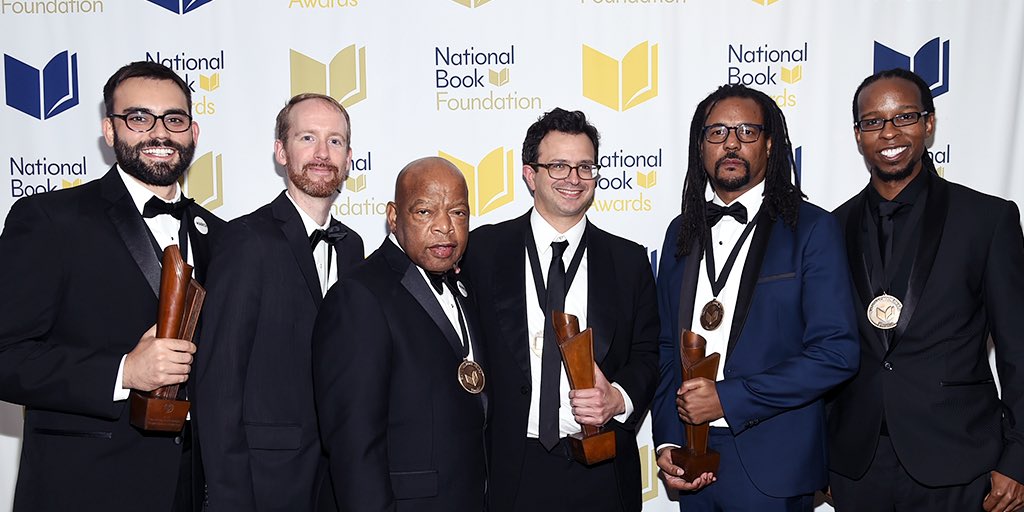Last night in New York City the National Book Foundation announced the winners of the 2016 National Book Awards. Daniel Borzutzky won in poetry for his collection The Performance of Becoming Human (Brooklyn Arts Press), and Colson Whitehead took home the fiction award for his novel The Underground Railroad (Doubleday). Ibram X. Kendi won in nonfiction for his book Stamped From the Beginning: The Definitive History of Racist Ideas in America, and John Lewis, Andrew Aydin, and Nate Powell won in young people’s literature for the graphic memoir March: Book Three (Top Shelf Productions/IDW Publishing). Each winner receives $10,000.

The ceremony was hosted by comedian Larry Wilmore, who along with award judges, winners, and presenters returned to the power and importance of literature, particularly in the current political climate. “Books give us hope,” said Lisa Lucas, the executive director of the National Book Foundation. “There’s no better way to start conversations about the world than reading. Let’s change the world one book at a time.”
The winners reinforced the idea that books can both advance and record social change. In his acceptance speech, poetry winner Daniel Borzutzky said, “Literature and poetry can serve as the means of preserving social and historical memory.” Fiction winner Colson Whitehead, whose book The Underground Railroad follows the story of two slaves trying to escape via the Underground Railroad, accepted the award and urged everyone to “be kind to everybody, make art, and fight the power.” Nonfiction winner Ibram X. Kendi, whose book details the history of racist ideas in America, said, “In the midst of racism there is the human beauty of the resistance to racism. That is why I have faith.”
“Let me tell you something,” Wilmore said after Kendi’s speech. “The National Book Foundation is woke.”
Congressman John Lewis, who along with Andrew Aydin and Nate Powell won in young people’s literature for the third installation of March—which chronicles Lewis’s activism during the Civil Rights Movement—took the opportunity to note how the social climate in America has changed. To explain the award’s significance to him, Lewis, who is the congressman for Georgia’s fifth congressional district, spoke through tears of being denied a library card growing up in a segregated Alabama. “I love books,” said Lewis. “Thank everyone, thank you, National Book Foundation.”
Earlier in the evening, the foundation gave the Literarian Award for Outstanding Service to the American Literary Community to the nonprofit Cave Canem. Established twenty years ago by poets Cornelius Eady and Toi Dericotte, the nonprofit works to advance African American poetry. Poet Terrance Hayes presented the award, and cited the Latin meaning of Cave Canem—“beware the dog”—to explain the importance of the organization’s work, especially in the face of ongoing discrimination. “Cave Canem is the fortification of your language, your history, your future,” said Hayes. “We must be the dog that guards the house.”
The foundation also honored biographer Robert Caro with its Medal for Distinguished Contribution to American Letters. Caro has written several notable biographies, including The Power Broker: Robert Moses and the Fall of New York (Knopf, 1975), and a set of four biographies about Lyndon Johnson.
The finalists for the awards were announced in October; each receives $1,000. The annual awards are given for books of poetry, fiction, nonfiction, and young people’s literature published in the previous year. Interviews with the winners and finalists, as well as the full video from last night’s ceremony are available on the National Book Foundation website.
Established in 1950, the National Book Awards are among the literary world’s most prestigious prizes. The 2015 winners were Robin Coste Lewis in poetry for Voyage of the Sable Venus (Knopf), Adam Johnson in fiction for Fortune Smiles (Random House), and Ta-Nehisi Coates in nonfiction for Between the World and Me (Spiegel & Grau).
Photo (left to right): Andrew Aydin, Nate Powell, Congressman John Lewis, Daniel Borzutzky, Colson Whitehead, Ibram X. Kendi






